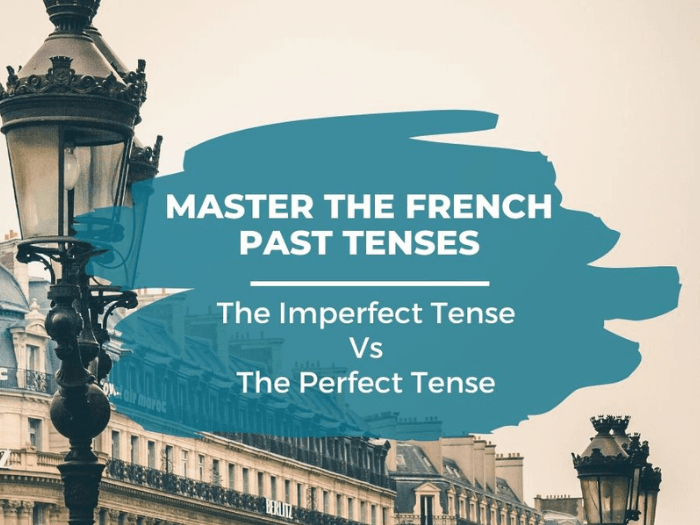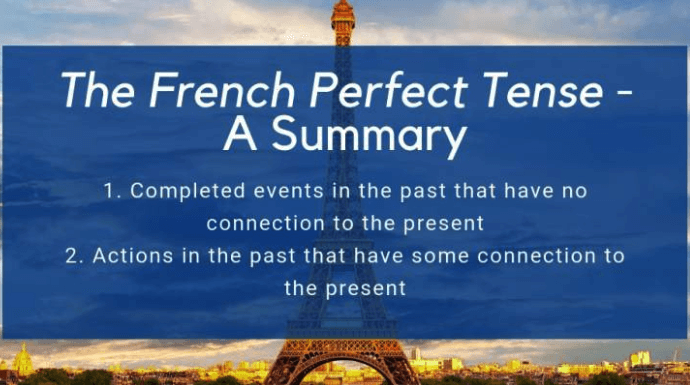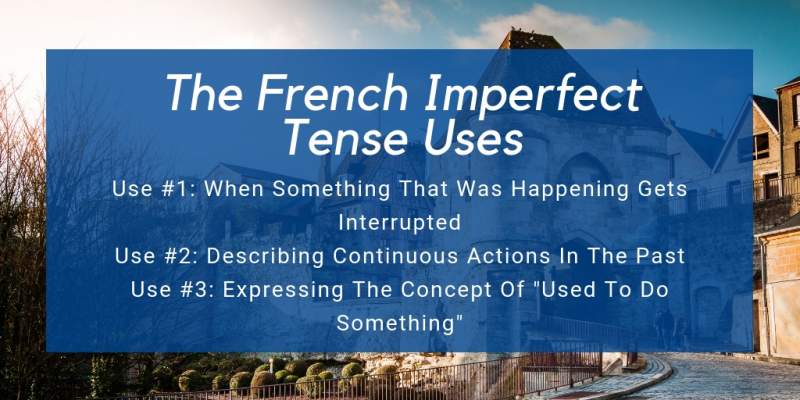
When you start learning French, you can expect to encounter grammar points that leave you feeling confused, like the past tenses in French.
One particular grammatical nettle you have to grasp fairly early on is the difference between the imperfect tense (imparfait in French) and the French perfect tense. And, truth be told, it can be a bit awkward at first.
The main reason for this is that it's tricky to know which one of these French past tenses to use in different situations.
But it’s not so difficult if you understand the basics clearly.
In this article, I'll compare the two French past tenses so that by the end of the post, you'll:
- Know when to use (and not use) the French imperfect and perfect tenses
- See why it’s not as hard as it might first seem.
So let's dive in and say au revoir to any confusion about the French past tenses.
Note: Since you can find the conjugations for these tenses in any decent grammar book or online, this will article will focus on something much more subtle and difficult – how to use the French past tenses correctly.
By the way, if you want to learn French through stories, not rules, my top recommendation for language learners is my Uncovered courses, which teach you through StoryLearning®. Click here to find out more and try out the method for free.
What Is “Tense”, Anyway?

It’s best to start right at the beginning. So first, what is “tense”?
Tense is what certain languages, including English and French, use to talk about the past, present or future.
You know how we say “I drink” for the present but “I drank” for the past? That’s “tense”.
For example, in English it works as follows:
- “I drink” is the present tense
- “I drank” is the past simple tense (sometimes also “simple past” or “preterit”)
- “I’ve drunk” is the present perfect tense.
These names of the different tenses are not so important. But we’re going to be talking about them later so it’s worth mentioning them now so that you don't become overwhelmed!
So now you know what tense is let's start looking at the different forms of the French past tense.
The French Past Perfect Tense
Before we start talking about the imperfect tense French examples, first, let’s take a look at the French “perfect” tense.
The perfect tense is what’s known as a “compound tense”, meaning it is made up of an auxiliary verb plus the past participle of the main verb.
That may all sound a bit technical. But it’s quite easy since in English, we form the present perfect in much the same way.
- In English, we say “I have eaten”
- While in French, the equivalent expression is j’ai mangé.
In the English version, “have” is the auxiliary verb and “eaten” is the past participle of the verb “to eat”; in the French version, ai is the auxiliary verb (ai is the first person singular of the verb avoir, “to have”) and mangé is the French past participle of the verb manger, “to eat”.
- Pronoun + Auxiliary Verb + Past Participle
- J'ai mangé
- Je = pronoun
- ai (from avoir) = auxiliary verb
- mangé (from the verb manger) = past participle
The only complication in French is that some verbs take the auxiliary verb être (to be) instead of avoir.
You don't need to know the details here – for the moment, it's enough just to be aware that in French, there are two possible auxiliary verbs.
The Biggest Mistake Beginners Make With The French Perfect Tense
The biggest mistake many beginners make with the French past perfect tense (parfait or passé composé in French) is to equate it with the present perfect in English.
This makes sense since we form these tenses in the same way – and often the best translation for an English present perfect is a French perfect – but French also uses its perfect tense when English would choose the past simple.
(Many French speakers often make the same mistake in the opposite direction, so when you hear this, now you'll know why!)
In English, if you say, “I have eaten a pizza”, that action has some connection to the present. Perhaps you're explaining why you are not hungry now. Or maybe you're giving an excuse for declining a dinner invitation.
In any case, to express this in French, you would use the perfect tense:
- J’ai mangé une pizza, je n’ai pas faim maintenant (I’ve eaten a pizza, I’m not hungry now).
However, in English, if you say, “I ate a pizza yesterday”, you use the past simple (“ate”) to express the idea that the action happened in the past, that it’s finished and has no connection to the present.
In French, you would express this as:
- Hier, j’ai mangé une pizza
As you can see, in French we use the same structure as in the previous example. The past tense in French does not distinguish between these two variations with different tenses like English does.
When Not To Use The French Perfect Tense
There are also times when English uses a present perfect tense where French requires a different tense altogether.
An important example is when talking about “how long”.
For example, the sentence “I’ve lived here for a year” expresses the idea that you have lived in a particular place for a year and that you still live there now.
In French, you would express this as:
- J’habite ici depuis un an
Here, you use the present tense. Literally, this translates as “I live here since one year”.
The French Perfect Tense – A Summary

In French, the perfect tense has two main uses:
- In spoken French, the perfect is used for completed events in the past that have no connection to the present:
- J’ai mangé une pizza hier (I ate a pizza yesterday)
- The perfect is also used for actions in the past that have some connection to the present
- J’ai mangé une pizza, je n’ai pas faim maintenant (I have eaten a pizza, I’m not hungry now)
Remember, the perfect is not used to say how long you have done something: “I have lived here for one year” translates as j’habite ici depuis un an, using the present tense in French.

The French Imperfect Tense
The imperfect tense in French is slightly more complicated in that it has no direct equivalent in English, either in form or in usage. However, like many aspects of language learning, it’s not difficult, it’s just different.
The French imperfect is known as the French past simple tense, meaning the form of the main verb changes and there's no auxiliary verb. For example:
- je regardais (I watch)
- tu regardais (you watch)
- il regardait (he watches)
Perhaps the best way to understand the French past imperfect tense is to focus on the idea that it expresses an action that took place for a certain duration. But the time when the action started or ended is not important.
Of course, we can express the same idea in English, we just say it in a number of different ways.

Use #1: When Something That Was Happening Gets Interrupted
One common use of the imperfect in French is in a narrative where something's happening and then something else happens, often interrupting the first action. Let’s think of some examples:
- The boy was running when he fell over
- The driver was texting when he lost control of the vehicle
- The writer was typing when the computer crashed and he lost all his work
In all of these examples, something was happening when something else happened. For the first verb in the sentence, French uses the imperfect; for the second, it uses the perfect.
- Le garçon courait quand il est tombé
- Le conducteur conduisait quand il a perdu le contrôle du véhicule
- L’écrivain tapait sur son ordinateur quand l’ordinateur s’est bloqué et il a perdu tout son travail
Sometimes, if you need to insist on the fact that the first action was being done at that moment, you can add the expression en train de (for example: le garçon était en train de courir quand il est tombé) – but it isn’t necessary.
In this type of sentence, the idea of “was doing something” is already part of the imperfect verb.
Use #2: Describing Continuous Actions In The Past
Another similar use, and one that is fairly easy to understand, is simply to describe a continuous action in the past – this time without another action happening to interrupt it. For example:
- He was crying
- It was snowing
- They were singing
In French, you express these examples as:
- Il pleurait
- Il neigeait
- Ils chantaient
Use #3: Expressing The Concept Of “Used To Do Something”
A final common use is to express something that happened habitually for a period of time. Again, let’s look at an example:
- When I was young, I often played football
In this sentence, we can clearly see that we are talking about a period of time (“when I was young”). And that we are talking about something that happened habitually. The addition of the word “often” reinforces this idea.
In English, we could also express this as:
- When I was young, I often used to play football
In fact, both versions of this sentence contain the idea of “used to”, even though it is only the second version states it explicitly.
In any case, when we wish to express the idea of “used to” in French, the idea that you did something habitually over a period of time, you use the imperfect tense:
- Quand j’étais jeune, je jouais souvent au foot
Past Tenses In French- How To Know Which One To Use

To finish up, let’s compare the perfect and imperfect tenses in French to highlight some further uses. And hopefully clear up any confusion that may remain.
A common misconception is to assume that for any instantaneous action, you should use the perfect, while for a longer action, you should choose the imperfect. However, the duration of the action is never the deciding factor in whether you use the perfect or imperfect in French.
Think about these three sentences:
- I slept all afternoon
- I’ve slept all afternoon
- I’ve been sleeping all afternoon.
Since “all afternoon” is a period of time, you might be tempted to use an imperfect tense in French. However, all of these sentences require the perfect:
- J’ai dormi tout l’après-midi
Choosing Between The French Past Tenses: Why It's All Perfectly Logical

Sometimes grammatical terms can be strange. But here, the words “perfect” and “imperfect” are actually quite logical if you understand what they mean.
The perfect describes a precisely defined (“perfectly” defined) period of time while the imperfect describes vaguely or imprecisely defined (“imperfectly” defined) periods of time.
Since “this afternoon” is a precise time period, all three sentences are expressed using the perfect tense.
Let’s take some other French past tense examples to make this even clearer:
- I watched TV for two hours/all afternoon
- J’ai regardé la télé pendant deux heures/tout l’après-midi
Since “two hours” and “all afternoon” are clearly defined, the verb should be perfect.
- I watched TV a lot when I was young
- Je regardais beaucoup la télé quand j’étais jeune
Since “when I was young” is imprecisely (“imperfectly”) defined. Compare these sentences:
- I lived there when I was a child
- J’y habitais quand j’étais enfant
Because “when I was a child” is imprecisely defined, but:
- I lived there for a year when I was a child
- J’y ai habité pendant un an quand j’étais enfant
Because “a year” is precisely defined (and the sentence is focusing on “a year” rather than “when I was a child”), in the second example we choose the perfect tense.
Master The Most Subtle Example: When Both French Past Tenses Are Possible
To finish, we can look at a slightly different example to illustrate another point.
Sometimes, you can use either the perfect tense or the imperfect tense to translate an English sentence correctly.
However, in these cases, the choice shows something about how the speaker views the situation or what they want to focus on. For example:
- Last year, I worked hard every day
- L’année dernière, je travaillais dur tous les jours
- L’année dernière, j’ai travaillé dur tous les jours
Both are correct, so what’s the difference?
In this case, the difference has nothing to do the period of time since, for both, we are talking about “last year”. Here we're dealing with something else, and the difference is quite subtle.
As we've seen, the imperfect expresses a habitual action. In contrast, here the perfect expresses a repeated action.
Here, if the speaker chooses the first example, what they wish to express is the idea that last year, they worked hard all the time and that it was considered normal and habitual to work hard every day for the entirety of the year.
If the speaker chooses the second option using the perfect, the idea is that every day, they worked hard over and over again.
The distinction is slight. A native speaker would instinctively know which one to choose to express their meaning. But it’s fairly certain he or she would have a hard time explaining why if you pressed them to do so!
French Past Tenses: Don't Think Too Much – Just Practice

When learning French tenses, grammar rules like these are similar to stabilisers on a bike. They help you start speaking, and at the beginning, you may rely on them, but with practice, you'll forget about the rules as you start speaking more naturally.
Mastering the past tense in French requires familiarising yourself with the rules. But the real learning is done through spending lots of and lots of time with the language. This way, you see the French imperfect and perfect tenses over and over again in context.
The more you can do this, the faster you'll develop a “natural feel” for when to use the perfect and when to use the imperfect in French.
With regular French past tense practice, soon enough, you will instinctively choose the right tense without even realising it – just like a native speaker!
Master French Grammar The Natural Way

If mastering French grammar like the imperfect tense requires you to spend a lot of time with the language, the question is, which material should you use and how do you find it at the right level?
Well, I've made it simple for you in my French Grammar Hero programme. It's specially designed for low intermediate to intermediate learners of French and helps you master the core grammar of French naturally, through story.
Instead of memorising rules and pouring over verb tables, your main job is to read a story in French and enjoy it. The grammar then emerges out of the story, but it's not the main focus.
In this way, you pick up the grammar, learn the past tenses in French in a natural way, and use it when you speak in French to sound more accurate and confident.
Click here to find out more and become a French grammar hero!

Olly Richards
Creator of the StoryLearning® Method
Olly Richards is a renowned polyglot and language learning expert with over 15 years of experience teaching millions through his innovative StoryLearning® method. He is the creator of StoryLearning, one of the world's largest language learning blogs with 500,000+ monthly readers.
Olly has authored 30+ language learning books and courses, including the bestselling "Short Stories" series published by Teach Yourself.
When not developing new teaching methods, Richards practices what he preaches—he speaks 8 languages fluently and continues learning new ones through his own methodology.









































